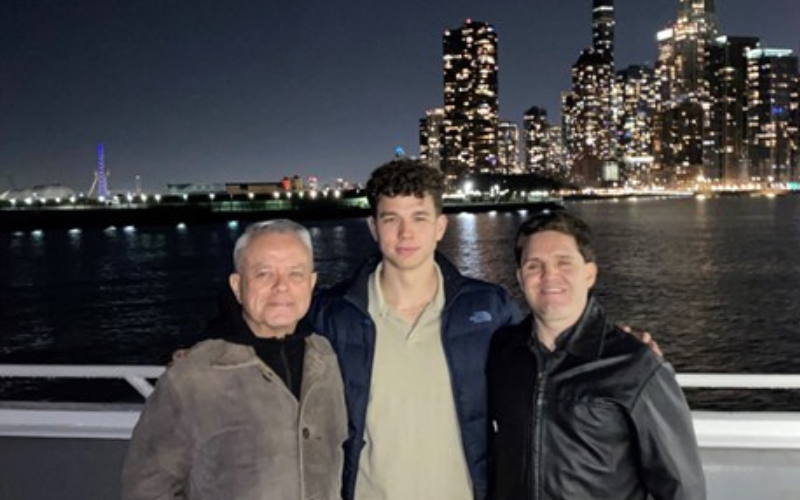
Pablo (center) with his father and (left) and brother (right)
By: Erin Weller
“I feel like I can see myself in these kids,” said former Pediatric Oncology Student Training (POST) grantee, Pablo Monterroso, reflecting on his work with children battling cancer. “I can see my brother in these kids. They are just like me and you, and all they want to do is live a normal life, go camping, play sports, have friends, and play outside. Every little piece of the puzzle that we’re able to work towards making this world a better place and making their experience better is giving back a whole childhood.”
Ever since he was a kid, Pablo knew the value of a “normal” childhood. Pablo’s older brother was 9 when he was diagnosed with a rare but benign tumor on his optic nerve. Seeing the impact of the diagnosis, treatment, and side effects on his brother changed Pablo’s perspective. “I’ve seen firsthand how difficult it’s been for him to navigate a world that’s not really set up for him,” he said.
As the son of an epidemiologist – who studies the spread of disease – and a midwife, Pablo’s lifelong interest and exposure to the medical field blossomed in college. In 2021, during his time as an undergraduate, Pablo received his first research grant from Alex’s Lemonade Stand Foundation (ALSF) to study hearing loss and language development in pediatric germ cell tumor survivors, through the POST program. These grants allow undergraduate, graduate, and medical students with an interest in pediatric oncology research to experience the field firsthand under the guidance of a mentor. With the support of mentor Dr. Jenny Poynter at Regents of the University of Minnesota, Pablo investigated the impact of hearing loss from childhood cancer treatment on language development. Using digital technology called Shoebox Audiometry, the research team collected data by sending out kits across the United States, Puerto Rico and Canada. Participants in the study tested their hearing using a pair of provided headphones and recorded the results on an iPad.
One of the greatest benefits of this type of research is that participants don’t need to travel to take part – which means the data could represent a more diverse population. As a Spanish speaker, Pablo could also translate scripts to ensure that some underrepresented demographics could still take part in the data collection. The kits were able to travel to kids in rural areas for families that may not be able to afford to travel long distances to participate in a study – thus breaking down economic, geographic, and language barriers.
After that summer, Pablo continued working with the lab and training new team members as the study grew. The lab received another grant from the Department of Defense and collected more than 330 hearing results. By comparing the data to the results of participant questionnaires and blood to germline analyses, they could learn a great deal about the impacts of germ cell tumor treatments.
Today, Pablo is a research coordinator in pediatric epidemiology and clinical research at University of Minnesota Medical School with his Bachelor’s degree in neuroscience. He’s published several papers – one of which stemmed from this very study, finding that about 20% of patients experienced hearing loss from treatment and 60% of those had extended high frequency hearing loss. While Pablo’s research career is just getting started, he’s eager to begin medical school in the fall, where he can continue making a difference through clinical epidemiology research. “It may seem so niche, but it’s all a piece of the puzzle. And, you know, it’s alright to just be that one piece, because you can’t see the full picture without that piece,” he says.
That’s why ALSF continues to fund POST researchers like Pablo each summer, welcoming 48 new grantees in 2024 alone – because anyone can be that one piece.

